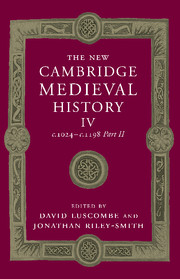Book contents
- Frontmatter
- 1 Introduction
- 2 The papacy, 1024–1122
- 3 The western empire under the Salians
- 4 Italy in the eleventh century
- 5 The kingdom of the Franks to 1108
- 6 Spain in the eleventh century
- 7 England and Normandy 1042–1137
- 8 The Byzantine Empire, 1025–1118
- 9 Kievan Rus’, the Bulgars and the southern Slavs, c. 1020 – c. 1200
- 10 Poland in the eleventh and twelfth centuries
- 11 Scandinavia in the Eleventh and Twelfth Centuries
- 12 Hungary in the Eleventh and Twelfth Centuries
- 13 The papacy, 1122–1198
- 14 The western empire, 1125–1197
- 15 Italy in the twelfth century
- 16 Spain in the twelfth century
- 17 The kingdom of the Franks from Louis VI to Philip II
- (a) Crown and Government
- (b) The Seigneuries
- 18 England and the Angevin dominions, 1137–1204
- 19 Scotland, Wales and Ireland in the Twelfth Century
- 20 The Byzantine Empire, 1118–1204
- 21 The Latin East, 1098–1205
- 22 ’Abbasids, Fatimids and Seljuqs
- 23 Zengids, Ayyubids and Seljuqs
- Appendix: genealogical tables
- List of primary sources
- Bibliography of Secondary Works Arranged by Chapter
- Index
- Map 1a The western empire: Burgundy and Provence in the eleventh century"
- Map 1b The western empire: Germany and the north-eastern frontier of Christendom in the eleventh century"
- Map 3 The kingdom of the Franks"
- Map 4 England and Normandy"
- Map 10 Germany under Frederick Barbarossa, c. 1190">
- Map 12 The Angevin empire"
- References
(a) - Crown and Government
from 17 - The kingdom of the Franks from Louis VI to Philip II
Published online by Cambridge University Press: 28 March 2008
- Frontmatter
- 1 Introduction
- 2 The papacy, 1024–1122
- 3 The western empire under the Salians
- 4 Italy in the eleventh century
- 5 The kingdom of the Franks to 1108
- 6 Spain in the eleventh century
- 7 England and Normandy 1042–1137
- 8 The Byzantine Empire, 1025–1118
- 9 Kievan Rus’, the Bulgars and the southern Slavs, c. 1020 – c. 1200
- 10 Poland in the eleventh and twelfth centuries
- 11 Scandinavia in the Eleventh and Twelfth Centuries
- 12 Hungary in the Eleventh and Twelfth Centuries
- 13 The papacy, 1122–1198
- 14 The western empire, 1125–1197
- 15 Italy in the twelfth century
- 16 Spain in the twelfth century
- 17 The kingdom of the Franks from Louis VI to Philip II
- (a) Crown and Government
- (b) The Seigneuries
- 18 England and the Angevin dominions, 1137–1204
- 19 Scotland, Wales and Ireland in the Twelfth Century
- 20 The Byzantine Empire, 1118–1204
- 21 The Latin East, 1098–1205
- 22 ’Abbasids, Fatimids and Seljuqs
- 23 Zengids, Ayyubids and Seljuqs
- Appendix: genealogical tables
- List of primary sources
- Bibliography of Secondary Works Arranged by Chapter
- Index
- Map 1a The western empire: Burgundy and Provence in the eleventh century"
- Map 1b The western empire: Germany and the north-eastern frontier of Christendom in the eleventh century"
- Map 3 The kingdom of the Franks"
- Map 4 England and Normandy"
- Map 10 Germany under Frederick Barbarossa, c. 1190">
- Map 12 The Angevin empire"
- References
Summary
from the death of Philip I in 1108 to that of Philip (II) Augustus in 1223 the Capetian monarchy made steady progress in asserting its authority over France. This secular rise levelled off in the second half of the twelfth century, but concluded with a dramatic upswing after the Third Crusade in 1190. Early accessions combined with congenital longevity produced lengthy reigns (Louis VI, 1108–37, Louis VII, 1137–80 and Philip Augustus, 1179–1223), but these regnal dates are of little import in charting the evolution of government. More significant is the punctuation introduced by military campaigns. By removing the monarchs from their realm, the Second (1147–9) and Third Crusades (1190–1) induced administrative innovations in the king’s absence. After Philip Augustus’s return in 1191 governmental tempo accelerated, marking the Norman invasion in 1202/3 and the victory at Bouvines in 1214 as the chief transitions.
FROM THE ACCESSION OF LOUIS VI TO THE SECOND CRUSADE (1108–1147)
History is little more than a function of its sources. As medieval governments began to generate their own documentation, these written sources subsisted in symbiosis both as products and evidence of the institutions that produced them. Louis VI inherited two genres of sources, charters and chronicles, from the first Capetians. Royal charters were written declarations of the king’s actions addressed to designated parties. Transcribed on parchment either by clerics working for the royal chancellor or by those employed by the recipients, they were authenticated by a wax seal. Since the royal household took few pains to copy these documents, their survival depended on their preservation or recopying by recipients, for the most part monasteries and churches.
Keywords
- Type
- Chapter
- Information
- The New Cambridge Medieval History , pp. 510 - 529Publisher: Cambridge University PressPrint publication year: 2004
References
- 2
- Cited by

